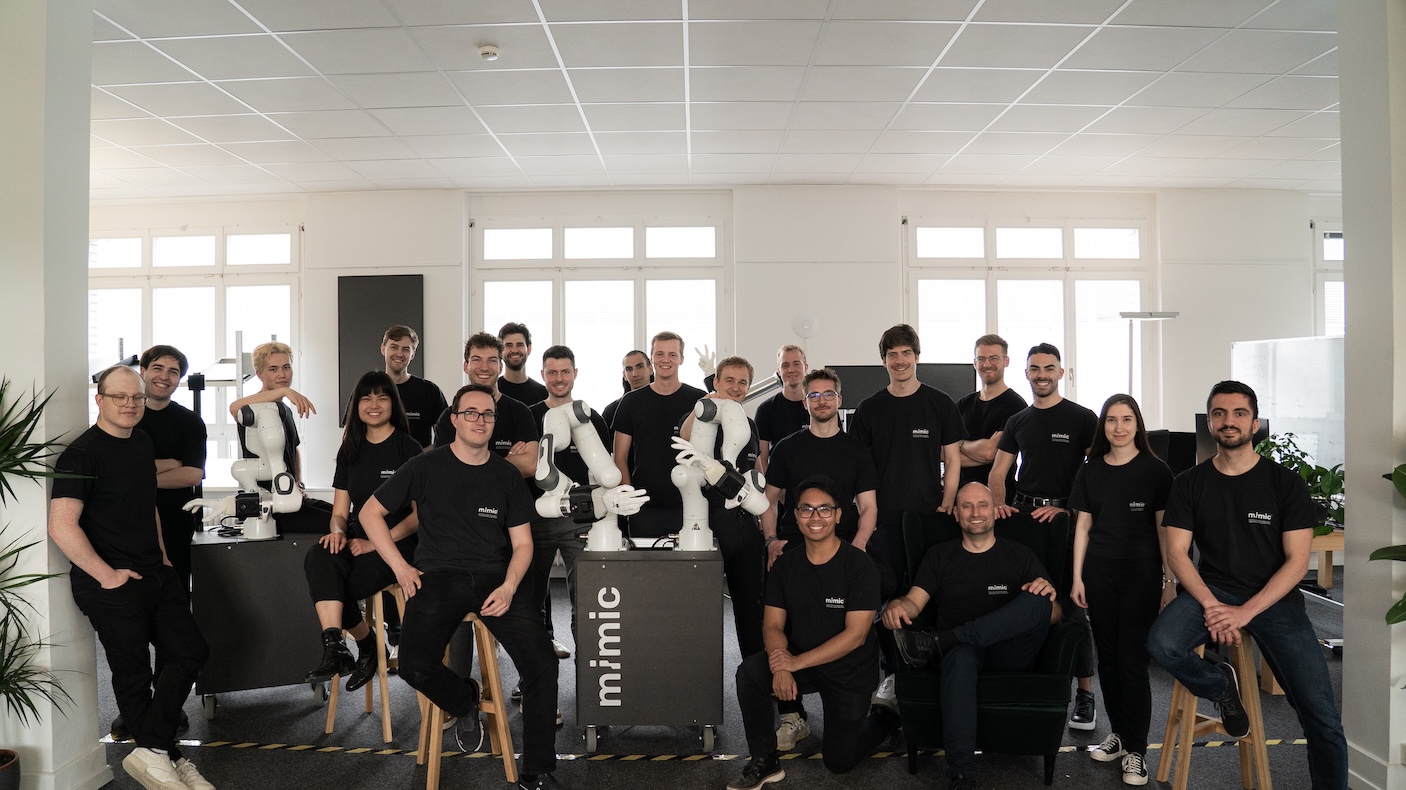2025: Navigating the Future of Innovation
In 2025, the landscapes of Deep Tech, Fintech, Health & TechBio, Climate Tech & Industrial Tech, SaaS & Infra, and Marketplaces & Consumer will continue to evolve at an accelerating pace, driven by technological breakthroughs and shifting market dynamics. One common thread across these industries is the emergence of AI — not just as a tool, but as a transformative force reshaping business models, consumer behavior, and global competitiveness.
The European startup ecosystem demonstrated remarkable resilience in 2024, with AI’s rise continuing, particularly at the early stage, while the wider late-stage funding market remained constrained.
To better understand the year ahead, we asked our sector-focused experts to explain the technologies, trends, and changes coming to their industries in 2025.
Deep Tech: A Year of Transition – Rick Hao
2024 was a year of reflection and recalibration for deep tech, particularly in the realm of AI. While the scale of AI models has reached new heights, the industry is beginning to grapple with the limitations of this growth.
The real bottleneck now lies in the availability of infrastructure and resources—most notably sourcing GPUs and energy for data centers. Notably, hyperscalers are now turning to nuclear energy as a solution—something that seemed unthinkable just a few years ago.
Looking ahead to 2025, the race to lead in quantum technologies is set to intensify, an area where Europe's positioning offers a unique advantage. Europe has an exceptional concentration of talent and research excellence in quantum technologies, and it is home to some of the world’s most advanced quantum research institutions. These institutions are fostering the emergence of innovative startups across both hardware and software, positioning Europe to lead globally in the quantum field.
Key themes for 2025 include:
- Embodied AI: As foundational AI models continue to mature, the integration of multimodal data—text, audio, video, and metadata—is enabling unprecedented synergy between AI and hardware. This evolution is poised to revolutionize robotics, where machines can learn new skills and tasks in ways that were once the exclusive domain of humans. The implications for industries like logistics and manufacturing are profound, as robots begin to perform complex tasks with greater autonomy and adaptability.
- SpaceTech: The cost of launching payloads into space has dropped dramatically, thanks to innovations led by SpaceX, opening the door to the burgeoning "space economy." While advancements so far have been concentrated in areas like telecommunications and high-speed internet, the falling costs and the advent of “launch and return” vehicles are unlocking immense opportunities. In 2025, we anticipate significant growth in fields such as Earth observation, space manufacturing, and inter-satellite communications and operability, pushing the boundaries of what is possible in space-based services.
- AI4Science: The deluge of data across scientific disciplines—from astrophysics to molecular biology—presents both a challenge and an opportunity. Advanced AI tools, paired with powerful computing resources, are helping researchers derive groundbreaking insights from vast datasets. This is exemplified by DeepMind’s release of AlphaFold 3, which delivers unprecedented accuracy in modeling molecular interactions and has revolutionized drug design. We expect similarly transformative applications across mathematics, engineering, and other sciences, making AI a cornerstone of the next generation of scientific discovery.
Fintech: Profitability and the Rise of Stablecoins – Olga Shikhantsova
2024 marked a turning point for European fintech, with major players like Revolut and Klarna demonstrating sustainable business models. These milestones are important for our sector, showing that consumer models can be profitable, having not been considered bulletproof before.
After years of skepticism about the sustainability of consumer fintech models, these companies have proven that profitability is not just achievable—it’s scalable. Yet challenges persist, particularly for new entrants. The strengthened positions of these two players, and their evolution into super apps, make it harder for new players to enter.
The fintech landscape has evolved significantly, particularly in consumer-facing services. Acquiring customers and generating revenue has become a snowball effect—more money from customers generates more revenue. However, opportunities still exist: Consumer plays remain important for emerging markets and for specific categories of customers, such as high-net-worth individuals (HNWI) and wealth tech.
Key themes for 2025 include:
- Identity & Security: Advanced fraud detection and compliance solutions becoming crucial as financial services digitize.
- Wealth Management: New platforms and tools democratizing access to sophisticated financial products.
- Capital Markets Innovation: Private debt markets and digital asset infrastructure, including stablecoin development.
- Regulatory Technology: Solutions helping companies navigate complex compliance requirements while maintaining innovation.
Health & TechBio: AI and Human-Centered Care – Andrea Zitna
Following two consecutive years of decline from the pandemic peak, healthtech VC funding has shown signs of resilience and rebound in 2024. This is in part driven by a frothy AI market which is also pulling up early stage valuations.
In later stages, the rising bar for series A/B fundraising continues. Many companies that raised at the peak of the market have not grown into their valuations. This means fewer series A/Bs, more extensions, more adaptability, more casualties, but also overcrowding of those companies that meet the shifting goalposts.
AI. AI. AI. More than 1 in 3 dollars invested in healthcare is now going into AI solutions. And with that, a lot of the eerily familiar VC dynamics are back. Valuations are high. Rounds are closing super fast. We’ve seen this before. Not so long ago. Let me be clear - I am enthusiastic about the potential of AI in healthcare and life sciences and I believe we will see some generational companies emerge on this intersection. However, I also believe AI is far from the sole answer to our healthcare woes - clinicians and services will remain the heartbeat - and huge amounts of capital will be burnt in the AI frenzy that’s under way.
Key themes for 2025 include:
- TechBio: We are bullish on companies that mix best in class biology, AI and pioneering research to (re)-look at complex modalities, open up access to novel and personalised therapies and increase success rates in clinic.
- Cyber resilience: Expanding digital, AI and connected devices’ footprint in hospitals ushers in new vulnerabilities, with real impact on patients and daily operations. We believe there is a growing need for new vertical solutions in this space.
- Procurement & supply chain: We believe a next generation of software can deliver real-time asset visibility, improve resource allocation and generate dramatic impact in providers’ productivity and bottom line.
- Ai-enabled service models: Pure SaaS solutions struggle with deployment across providers and pharma alike. We believe that AI-enabled, hybrid software and service models will be the backbone of Europe’s largest healthcare companies.
Climate Tech: The Next Frontier – Andreas Schwarzenbrunner
With around €2 billion invested in 2024, most of the capital in our sector has gone into the energy transition. This transformation of the European economy to a zero-carbon energy world opens up massive opportunities but also brings significant challenges to traditional businesses. The year saw particular focus on two key areas: energy transportation and storage, and procurement and trading solutions.
While many are calling time on climate tech as an industry, I am optimistic about the future of the sector because of the resilience of the European economy and because its main industrial sectors require massive investments. We are lagging behind in productivity, digitization, and this, combined with high energy prices and unfavorable demographics, means we have no alternative but to invest in upgrading Europe’s industrial base.
Looking ahead to 2025, I’m particularly excited about industrial tech. From low-code platforms to conversational interfaces, AI is set to radically improve robotic training processes. We’re also seeing tremendous potential in quality control and maintenance, with AI enabling multi-dimensional data analysis and automated fault detection. Similarly, opportunities in design and development are emerging, where AI enables new possibilities for stress testing and simulation engines for structural, temperature, and fluid analyses.
Key themes for 2025 include:
- Robotics & Automation: AI-powered improvements in robotic training and seamless human-robot collaboration.
- Quality Control & Maintenance: Multi-dimensional data analysis enabling automated fault detection and predictive maintenance.
- Design & Development: AI-driven stress testing, simulation engines, and automated CAD design integration.
- Industrial Process Optimization: Automation of mid- and back-office tasks addressing labor shortages.
Marketplaces & Consumer: AI and Gen Z First – Jeroen Arts
2024 has been a year where hype and reality coexisted more closely than ever. While 2023 felt like the early innings of AI adoption, 2024 was more like an AI tidal wave. Marketplaces and consumer businesses have embraced AI technologies at unprecedented speed, leveraging them to both enhance the customer experience and improve internal efficiencies.
We’ve seen AI deliver tangible results in search optimization and matching experiences, making it easier for users to find exactly what they need. Internally, companies are using AI to streamline operations, scale customer support, automate sales, and accelerate product development. This combination of enhanced customer experience and improved internal efficiency has unlocked significant opportunities.
At the same time, as venture capital continues to flow into AI-driven companies, we can’t ignore the signs of a potential bubble. Many new AI-focused marketplaces and consumer startups lack defensibility or differentiation. Additionally, backchannel feedback from existing AI companies often doesn’t align with the hype surrounding them. While there are undoubtedly exciting and highly vertical AI plays emerging, the rush to jump on the “AI bandwagon” has led to noise in the market.
The impact of generational shifts is reshaping consumer behavior fundamentally. As Gen Z enters the workforce and becomes an increasingly dominant consumer demographic, their online-first behavior is reshaping industries. Growing up in a mobile-connected, always-online world, their approach to transactions and operations is vastly different from that of prior generations.
Key themes for 2025 include:
- Super-Vertical Marketplaces: AI enabling highly specialized platforms targeting underserved niches.
- Marketplace-SaaS Convergence: Hybrid business models combining transaction and software elements.
- Gen Z-First Platforms: Services built specifically for digital-native behaviors and preferences.
- AI-Enhanced Operations: Automation of customer support, sales, and product development.
SaaS & Infra: AI-Powered Transformation – Markus Lang
2024's biggest surprise was the sheer pace of enterprise AI integration. Companies moved from pilots to full-scale deployment faster than expected, though Europe's exit landscape remains challenging. Liquidity routes are subdued, and IPOs are concentrated in a few markets, underscoring the need for structural reforms.
The region faces both distinct challenges and opportunities. European SaaS startups, in particular, grapple with three critical hurdles: talent acquisition, regulatory complexity, and market fragmentation. However, these challenges also foster resilient, adaptable companies—those that navigate them effectively are positioned to build stronger differentiation on the global stage.
While Europe boasts world-class talent and visionary founders, the regulatory and structural barriers remain a significant hurdle. For Europe to continue leading in AI and SaaS, bold reforms, like the 'EU Inc' proposal, are crucial to avoid falling behind.
Key themes for 2025 include:
- Embedded AI Tools: Intelligent automation, digital twins, and AI copilots enhancing vertical SaaS.
- Enterprise Platform Evolution: Deep integration of AI into core business processes.
- European Competitiveness: Focus on structural reforms to maintain pace with global innovation.
- Vertical-Specific Solutions: AI-powered tools tailored to industry-specific challenges.

.png)
















.svg)
